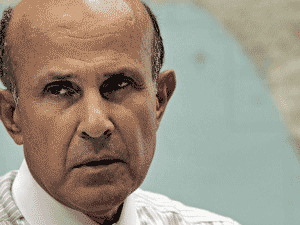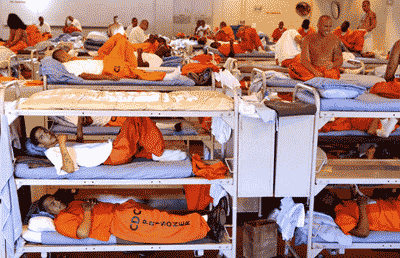Los Angeles County is so broke that the sheriff is cutting costs by releasing hundreds of inmates from county jails early. Over the past three months, more than 350 inmates from the nation's largest county jail have been handed what amounts to a get-out-of-jail-free card.

L.A. County Sheriff Lee Baca says budget shortfalls are forcing him to release nonviolent inmates early. (Nick Ut/AP)
Anthony Vargas left the county's twin-tower jail downtown after serving half the time he was supposed to for commercial burglary and forging a prescription.
"It's called day-for-day," Vargas says. "Every day you serve in jail counts as two days."
Another just-released inmate, Steve Gutierrez, was sentenced to 80 days behind bars for driving without a license and for violating a restraining order. But he served just 10 days and left jail wearing an ankle bracelet to monitor his movements.
"Good for me," he says while carrying his belongings in a jail-issued plastic bag. "Who wants to shower next to all these men? Who wants to go to the bathroom next to all these guys? ... The food is terrible. And you're freezing to death in there. It's bad."
'Money Does Matter'
The early-release program was intended for people like Gutierrez, people who are not known gang members, who don't have a violent criminal history. "People with Mickey Mouse crimes, like tickets," Gutierrez says.
L.A. County Sheriff Lee Baca says budget shortfalls are forcing him to release inmates like these early.
He's trying to cut $128 million from jail operations. Baca's also eliminated overtime pay for deputies and is even getting back in a patrol car himself every Friday.
"No one likes early release," says Baca. "I don't like it. I ... think the governor doesn't like it, and no city wants it. The whole point of it all is - money does matter. And public safety should be the last thing cut out of government."
Baca says he'd rather inmates serve at least 80 percent of their sentences.
But 35 years ago, the L.A. County Jail was so jampacked that inmates were released after serving just 10 percent of their jail time. Back then, a federal judge ruled the overcrowding amounted to cruel and unusual punishment.

Inmates sit in crowded conditions at California State Prison in Los Angeles. Like many California prisons, L.A. County jails are releasing prisoners early - before serving their entire sentences - because of budget constraints. (AP)
"We had people sleeping on the roof of men's central jail," says sheriff spokesman Steve Whitmore. "We had 10,000 people. We had people in the hallways. It was just brimming. And so the judge said, 'You can't do this anymore. You gotta get them off the roof.' "
Dangers Of Recidivism
Today, California prisons are under order to reduce overcrowding. That resulted in a new state law that's being applied to some county jails. But in Los Angeles, it's money that's driving the early releases. UCLA professor Michael Stoll says others around the country are doing the same.
"Most states are experimenting with releasing nonviolent, low-level offenders in part because most states have faced the same kind of budget crisis that California is facing," says Stoll.
But some people fear the kind of scenario that happened in Sacramento, Calif., last month.
The sheriff's department released 22-year-old Kevin Peterson after he had served only half his four-month sentence for violating probation. Less than a day later, Peterson was arrested for attempted rape.
"Granted, you're going find in every state a case in which you release someone early from prison, and they go on and recommit a crime, some of them more heinous than others," says Stoll. "Even when people serve out their time and are released from prison unconditionally, there's always going be that risk, too."
Sheriff Lt. Kevin Kykendal says inmates are carefully screened before they're released and monitored once they get out. But he says letting them out early is still a big deal.
"I think all inmates should serve 100 percent of a time," says Kykendal. "But with fiscal constraints, the economy the way it is doesn't allow us to do that."
Last month, Kamil Blaze walked out of jail after serving only half of his six-month drunk-driving sentence.
"Anyone getting out of the hellhole early, it's a good thing," he says. "I'm not a rapist, a murderer - you don't have to lock up your doors, hide your children."
Now that he's out, Blaze says he's already enrolled in school with a part-time job.
"I'm already contributing to society as opposed to taking away your taxpayer dollars for me to be sitting in there," he says. Blaze adds that being in jail does not do anyone any good.
The real test of the early-release program is whether former inmates like Blaze can stay out of trouble and out of jail.











